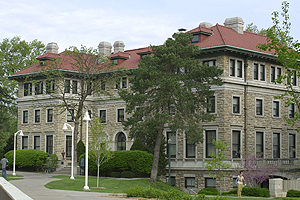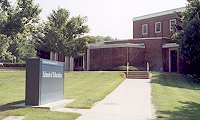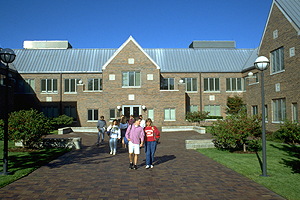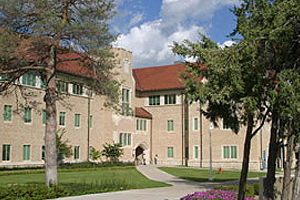Students come to UMKC to learn and faculty come to UMKC to teach and engage in scholarly and creative activities. In the Office of the Provost, we provide a support framework so they can, and we celebrate their successes. To find out more about how we do that, contact the Office of the Provost at 816.235.1107 or visit our website at www.umkc.edu/provost.
Provost and Vice-Chancellor for Academic Affairs:
Gail Hackett, Ph.D.
Website: www.umkc.edu/provost

The College of Arts and Sciences, the original school of the university, was chartered in 1929 as the private University of Kansas City. Now the largest school of the University of Missouri-Kansas City, The College has served the Kansas City area through its teaching, research and public-service mission since 1933. The College, together with other schools, joined the University of Missouri System in 1963 and formed the University of Missouri-Kansas City. With eighteen departments, fifty-three undergraduate degree programs, twenty-six masters programs and a rapidly growing interdisciplinary PhD, The College of Arts and Sciences is the heart of a vital urban university. Departments include the humanities (including Architecture, Art & Art History, Communication Studies, English, Foreign Languages, Philosophy and Theatre), Social Sciences (Criminal Justice, Economics, History, Political Sciences, Psychology, Sociology, and Social Work) and the Natural Sciences (Chemistry, Geosciences, Mathematics and Physics).
Dean: Karen Vorst, Ph.D.
Website: http://cas.umkc.edu
 The School of Education, organized officially as a separate academic division in 1954, was the result of the University of Kansas City's involvement in professional education since 1940. At that early date the University was offering an M.A. in education, heavily liberal-arts laden, with most classes conducted in the summer and evenings. An undergraduate major in elementary education was established in 1952, and the first University of Kansas City doctoral program, the Ph.D. in education, was inaugurated with the organizing of the school in 1954. Since 1954, the school has grown to include three disciplinary divisions with 18 programs, offering bachelor of arts, master of arts, educational specialist and doctor of philosophy degree programs. Several degree and certification programs are offered in cooperation with the the School of Biological Sciences, the Conservatory of Music and the College of Arts and Sciences.
Dean: Linda L. Edwards, Ed.D.
Website: www.umkc.edu/education
The University Libraries provide information resources and services, and study and research facilities supporting academic programs and community needs. Partnerships bring to students, faculty and community members information resources from around the world. Collaborative learning environments and the intensive use of technologies characterize the Miller Nichols Library, Health Sciences Library, and Dental Library.
Dean and Director of Libraries: Sharon L. Bostick, Ph.D.
Website: http://www.umkc.edu/lib/
Students come to the UMKC School of Nursing to hone their passion for people with the skills and technical knowledge to give them lasting careers in health care. The School of Nursing offers advanced degrees to nurses who wish to continue their education and began offering a pre-licensure Bachelor of Science in Nursing (B.S.N.) in 2001.
The School of Nursing was established in 1979, although nursing degrees were offered prior to that through UMKC’s graduate studies program. Today the School offers several master’s degrees including family, adult, pediatric, women's health and neonatal nurse practitioner programs; bachelor’s and master’s completion programs for registered nurses; and a cooperative Ph.D. program in nursing. The School of Nursing is working to address the nursing shortage and lack of diversity within the nursing workforce through its partnerships and through grants that fund initiatives to recruit and retain students.
Dean: Lora Lacey-Haun, Ph.D.
Website: http://www.umkc.edu/nursing
 The University has offered business courses since 1933. In 1953, with the support and encouragement of the Kansas City community, the School of Business Administration was established. In 1965, the Cookingham Institute of Public Affairs was created. Since that time, the Bloch School of Business and Public Administration has grown to a student body of 950 and a faculty of some 45 professional educators. In January 1988, the School was renamed for Henry W. Bloch, co-founder of H&R Block, and moved into a newly expanded building. The School offers undergraduate and graduate programs in business administration, public administration and accounting.
The Bloch School is accredited by AACSB International - The Association to Advance Collegiate Schools of Business, and by the National Association of Schools of Public Affairs and Administration.
Interim Dean and Marion Bloch/
Missouri Chair in Leadership: Lee Bolman, Ph.D.
Website: http://www.bloch.umkc.edu/
The UMKC School of Medicine, founded in 1971, offers an innovative 6-year combined baccalaureate/M.D. degree in a community-based setting. Curriculum is based on early and continuous clinical experiences, humanities, small group learning centered around a physician "docent," continuous assessment of progress, and emphasis on application of the basic sciences in clinical medicine. The School has over 600 medical students, 570 full-time faculty, 670 volunteer faculty, 375 residents and fellows in 32 ACGME sponsored programs, four affiliated hospitals, one affiliated physician practice plan, growing research programs, and links to community activities including the Life Sciences Initiative.
Dean: Betty M. Drees, M.D.
Website: http://www.med.umkc.edu
William P. Borland, Edward D. Ellison and Elmer N. Powell founded the University of Missouri-Kansas City School of Law in 1895 as the Kansas City School of Law. The Law School continues to build and equip quality attorneys who take pride in practicing their profession all over the world.
Dean: Ellen Suni, J.D.
Website: http://www.law.umkc.edu/
 The mission of the School of Computing and Engineering (SCE) is to provide nationally competitive educational opportunities and focused research in Computing and Engineering to the students of the Midwest region - generating the technical work force and research results needed to drive the economic development of the region including entrepreneurial activities. The University began hosting engineering degree coursework in 1956 by offering the Bachelor of Science in General Engineering. In 1978 the Engineering disciplines become ABET accredited. Increased technology demands during the mid-‘80s helped to build a long lasting partnership between UMKC and Sprint coupled with the added success of UMKC’s high-tech computer science and telecommunications program. Today the School of Computing and Engineering offers undergraduate, graduate and Interdisciplinary PhD’s in the fields of Information Technology, Computer Science, Civil, Electrical and Mechanical Engineering.
Dean and Professor:
Dr. Kevin Truman, Ph.D.
Website: http://www.sce.umkc.edu/
Founded little more than a decade ago, the School's pioneering programs in molecular genetics, structural biology and proteomics nurture the intellectual capital necessary to fuel the economic development of biotechnology in Kansas City.
Dean and Professor: Lawrence Dreyfus, Ph.D.
Website: http://sbs.umkc.edu/
Since 1906, the Conservatory of Music and Dance has set the standard as the most comprehensive music and dance education center in the Midwest.
The Conservatory offers a range of degree options, a talented artist-faculty, and a caring environment that nurtures excellence and promotes real opportunities for personal and professional growth.
Across the globe you'll find Conservatory graduates in national opera companies, Broadway productions, dance companies and symphonies.
They teach music from grade school to college, work as music therapists in health-care and well-being facilities, and direct or serve in church music programs.
Dean: Peter Witte, M.M.
Website: www.umkc.edu/conservatory
The UMKC School of Dentistry traces its roots to 1881, when the Kansas City Dental College was founded as a department of the Kansas City Medical College. In 1919 the Kansas City Dental College merged with Western Dental College to form the Kansas City Western Dental College. It became the School of Dentistry of the University of Kansas City in 1941. In 1963 the school became the School of Dentistry at UMKC.
Over the years, the school's educational standards and opportunities have increased as the school has consistently demonstrated its ability to educate well-qualified dentists and dental hygienists to contribute to the improvement of dentistry. As an affirmation of this, (the D.D.S., the graduate certificate programs: advanced education in general dentistry, periodontics, pediatric dentistry, oral and maxillofacial radiology, oral and maxillofacial surgery, endodontics, and orthodontics and dentofacial orthopedics, and the B.S. in dental hygiene) are fully accredited by the Commission on Dental Accreditation of the American Dental Association.
Interim Dean: Nancy Mills
Website: www.umkc.edu/dentistry
The School of Graduate Studies is responsible for monitoring compliance to the campuswide minimum graduate academic regulations, which are explained in detail in the General Graduate Academic Regulations and Information section of this catalog. Working with and through the Graduate Council and Graduate Officers Committee the School also provides leadership and coordination of all graduate programs, offers programs to prepare graduate students for faculty positions in a variety of educational settings, and administers a number of competitive graduate fellowships.
The School also serves as the academic and administrative home for students admitted to the Interdisciplinary Ph.D. program. All other graduate students are admitted to the School or College in which their degree programs are housed.
Ph.D. Program in Interdisciplinary Studies (IPhD)
The world of the future will require scholars with a global approach to problem solving. It will no longer be enough to know one area, one discipline, or one field of study. Inquiry and discovery are crossing disciplines. With this in mind, the mission of the PhD. Program in Interdisciplinary Studies is to span traditional boundaries among disciplines while helping students develop knowledge and skills for independent research on the fundamental questions of the present and the future. Prospective students must be admitted to at least two disciplines (Coordinating and Co-Discipline). We offer 26 Coordinating discipline choices and 27 Co-Discipline choices.
Dean: Ronald A. MacQuarrie, Ph.D.
Website: www.umkc.edu/sgs
Originally organized in 1885 as the Pharmaceutical Department of the University of Kansas City, the school was reorganized and reincorporated in 1898 as the Kansas City College of Pharmacy and Natural Science. In 1943, this forerunner of the present school joined the University of Kansas City as its third professional school.
When the University of Kansas City was incorporated into the University of Missouri System in 1963, the School of Pharmacy became the only state-supported pharmacy school in Missouri. In October 1985, the school observed its centennial celebration, commemorating 100 years of progress in pharmaceutical education, research and service.
The School of Pharmacy is a member of the American Association of Colleges of Pharmacy (AACP). The doctor of pharmacy program is accredited by the American Council on Pharmaceutical Education (ACPE). The most recent accreditation review was in
2003, when full accreditation was continued. The next on-site accreditation review will be during the 2009-10 academic year. Anyone interested can contact ACPE at http://www.acpe-accredit.org for more information.
Dean: Robert W. Piepho, Ph.D., FCP
Website: www.umkc.edu/pharmacy
|


 The School of Education, organized officially as a separate academic division in 1954, was the result of the University of Kansas City's involvement in professional education since 1940. At that early date the University was offering an M.A. in education, heavily liberal-arts laden, with most classes conducted in the summer and evenings. An undergraduate major in elementary education was established in 1952, and the first University of Kansas City doctoral program, the Ph.D. in education, was inaugurated with the organizing of the school in 1954. Since 1954, the school has grown to include three disciplinary divisions with 18 programs, offering bachelor of arts, master of arts, educational specialist and doctor of philosophy degree programs. Several degree and certification programs are offered in cooperation with the the School of Biological Sciences, the Conservatory of Music and the College of Arts and Sciences.
The School of Education, organized officially as a separate academic division in 1954, was the result of the University of Kansas City's involvement in professional education since 1940. At that early date the University was offering an M.A. in education, heavily liberal-arts laden, with most classes conducted in the summer and evenings. An undergraduate major in elementary education was established in 1952, and the first University of Kansas City doctoral program, the Ph.D. in education, was inaugurated with the organizing of the school in 1954. Since 1954, the school has grown to include three disciplinary divisions with 18 programs, offering bachelor of arts, master of arts, educational specialist and doctor of philosophy degree programs. Several degree and certification programs are offered in cooperation with the the School of Biological Sciences, the Conservatory of Music and the College of Arts and Sciences.

